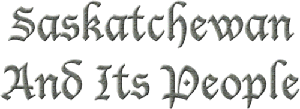PERSONAL KNOWLEDGE OF THE EARLY EUROPEAN IMMIGRANT.
THE EAST LONDON SETTLEMENT.
there's a bit more of a chance 0' gettin' a crust for 'em in this country,
an a good thing it is, fer I'm gettin' quaite a crop of 'em now. Three
of 'em born 'ere, 'ealthy lookin' kids, aint they naow? 'Ere Luke, you
'old up yer 'ead for the laidy." He picks Luke, aged four, up by the back
of her waistband and holds her limp and dangling for inspection. "Git
the baiby, waife. There naow," as a fat, feeble little head was Un-
covered to the scorching wind, "that un was jist horn a week was yistid
dy~look at 'er."
"But cover it up; cover it up," we shrieked at its mother.
"Oh, she'll do well enough, We begin 'ardin' of 'em early. She'll git
used to it. They're all thrivin.' An' she'll soon be useful, too. That
'Un there's only three an' she kin run after 'er father an' the plough an'
pick up potatoes with any of 'em. We soon turns 'em to somethin' an'
they're worth all they cost."
John is jocular. "There's one thing," he says, "as I'm thankful fer,
an' that is that none o' the neighbors kin come to me an' say as one o'
my boys 'as broke 'is winder with a stone. An' there's no school board
down on me for keepin' 'em out o' school. Ner no rent to pay. 'Ome if
ye'd scrape a bit up to buy bread with, slap 'alf of it 'ud go every Monday
mornin' fer the rent' er else ye'd be turned out. Them three things I 'ave
got to be thankful fer." Yet in three minutes he is complaining about
the section's lack of a school. We asked about the prosperity of bis
farm, and John's face at once assumes a depression directly traceable to
the presence of the one creditor the world has for him. "Well, yes, 1
won't say but what we're doin' pretty fair on the 'ole, but its 'ard scratch-
in', an' wot Wi' the frost an' my calf breakin' of 'er neck, we won't be
able to do nothing on the debt this year, though I'd laike to get it paid, an'
nobody better. She was allers a leadin' of the others hoff an' makin'
trouble fer me, so I got a rope and tied 'er up, little thinkin' she'd break
er neck on me with it. An' Wi' that an' the frost, I've had a slaice o' bad
luck like, but we're gettin' on pritty fair I must say, an' next year we 'opes
to do better on the debt. Beginnin' with one ox, an' we couldn't afford
no more, was a set back laike, but naow I've a got two its a sight easier."
You must supply for yourself the indescribable upward inflection of
the cockney, the twinkle and the grimace. The next Londoners are wholly
different. A fresh-faced woman, with a wholesome voice and smile, wel-
comes us, her arms covered with flour from kneading bowl, apologises for
the bare feet of her tidy children, talks intelligently about the crops and
prices, and tells us her hope of a "cayuse" pony this year, it is so slow,
three hours, going to town with her butter and eggs behind the oxen.
"He" is outside tossing sheaves from the wain, and making a mellow pie-
ture with his red oxen against the evening sky. Both are hopeful and
contented, and the children are drawing in the breath of the prairie and
And nobody, whatever the petty complaint of the moment, is really
dissatisfied or wants a change. They "get homesick sometimes" especially
the women, and long for the odds and ends of household furnishing
they
Bibliography follows:

